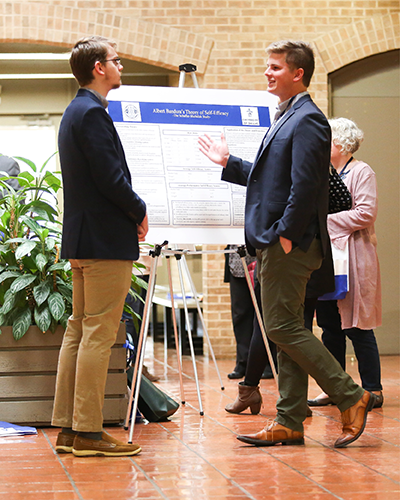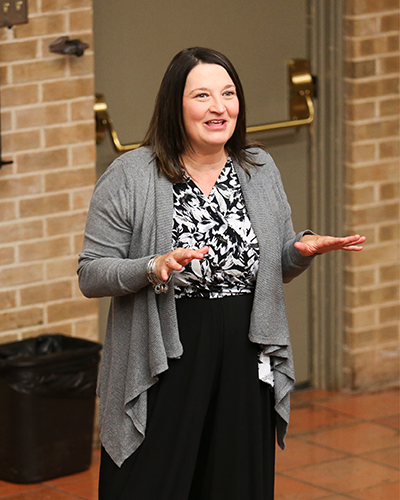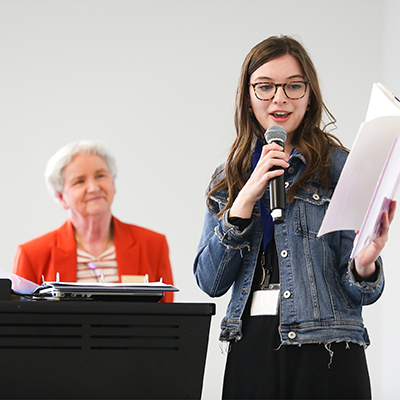 Menu
Menu



In our current condition, with most of the U.S. sheltering in place and/or learning and working from our homes, it’s hard to imagine that just 20 days ago, teachers and those aspiring to be teachers gathered together for the fourth annual Excellence in Education conference at the University of Dallas, organized, run and sponsored by UD’s Education Department, but so they did, and so we will all do — gather together, that is — some day again.
The same teachers who joined us on March 7 are now likely using tools and inspiration from that day, and whatever other tools and inspiration they have at their disposal, to connect with their students remotely. Whether they teach pre-K or college, these teachers remain very influential in their students’ lives throughout the current COVID-19 public health crisis and whatever other future challenges, related to this one or not, may arise.
As the conference’s keynote speaker Michelle Yzquierdo, Ph.D., counseled us, “Grit and perseverance are two of the most important qualities a person can have. Believe this, and teach your students to believe it. Either find a way, or make one.”
Yzquierdo specializes in English-language learners (ELLs) and is the author of Pathways to Greatness for ELL Newcomers. A first-generation college graduate, she worked as a U.S. Customs officer for a year or so after receiving her bachelor’s degree, then decided to become alternatively certified to teach. She began by substituting, quickly ruling out grade levels: first she decided against elementary, then middle school. After subbing for a high school chemistry teacher, it took all of her willpower to go back the second day, but go back she did, and thereby landed herself a full-time teaching gig.
Yzquierdo is not bilingual, but she became, by default, the point person for ELLs at the school where she taught, eventually went on to get her doctorate, and now is a sought-after trainer and presenter on that subject as well as others related to teaching. During the March 7 conference, she also spoke about “Structured Reading and Writing for Struggling Students (and Everyone Else, Too),” in which she discussed strategies for strengthening literacy skills, including teaching academic language: “Oracy is the path to literacy,” she explained. “Students cannot write in a way they cannot speak.”
The daughter of a Danish immigrant mother whose first language was not English, Yzquierdo herself was a gifted student who was often excluded from the classes that would have inspired and challenged her because her standardized test scores were too low; her scores were low because she had no grasp of academic language.
To help students learn this academic language, teachers should provide multiple opportunities for students to speak, such as involving them in structured conversation: putting them in partners so they know to whom they are going to speak, assigning them a role in the conversation so they know what they are going to say, and providing sentence stems so they know how they are going to say it. An example of a sentence stem is, “One concern for struggling students might be ____.” They would say the stem and fill in the blank.
Another strategy advocated by Yzquierdo is partner reading, in which students read in partners; they are paired with someone at their same reading level so as to diminish self-consciousness about reading aloud. They are given questions to answer, and the partner who is not reading must listen to learn the answers to the questions.
Yzquierdo also spoke about cultural intelligence (CQ). She encouraged teachers to go beyond awareness and acceptance of other cultures to the celebration of them. This is all part of knowing your students and building a culture of care, incorporating several important points that students need to know:
Other speakers included Affiliate Assistant Professor of German and Spanish, Co-Director of Comparative Literary Traditions and Director of the Humanities Program Laura Eidt, Ph.D., who discussed using illustrations in teaching classical children’s literature; John Hodges, M.A., CDT, CALT, scholars coordinator and SEE co-coordinator at the June Shelton School and Evaluation Center, who gave an enlightening presentation on understanding dyslexia and learning differences; Mandy Stewart, Ph.D., who teaches at Texas Woman’s University and is the author of Keep It R.E.A.L., and spoke about biliteracy and ESL; and Joanne Zipay of Shakespeare Dallas, who shared some insights on having fun with Shakespeare.
Hodges himself is dyslexic and has ADHD; his mother used to introduce him as “her son John, who has ADHHHHHHHHD.” He explained that reading, unlike speaking, is not a natural process; it must be taught. Dyslexia is genetic; the brains of dyslexic people actually form differently during gestation. Reading for them can be like people who are not dyslexic trying to read in a foreign language, or even a language composed of a jumble of nonsensical symbols. However, their brains can, with training, be rewired in order to make reading possible.
"UD's Education Department is pleased to be able to serve our students and local educators in fostering educational excellence through this event, which highlighted ‘Language and Literacy’ this year,” said Associate Professor and Chair of Education Amie Sarker, Ph.D. “Our educator preparation program focuses not only on sound academic preparation but also on strong professional preparation with specific emphasis given to moral and ethical issues embedded in what it means to be a teacher for all. Our hope is that this event allows our community of educators to celebrate strengths, reflect on potential areas of growth, and learn new strategies as we explore critical issues in education and hear from engaging speakers on current topics of importance in today's educational environments."
In the midst of the COVID-19 crisis, our teachers remain, albeit via technology at the moment, on the frontlines of their students’ education. Discover more about UD’s Education Department and programs for teachers, as well as resources for classical education.